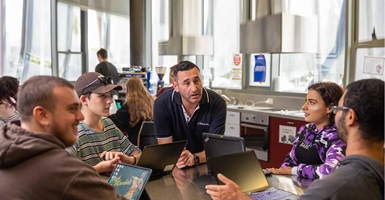You know what they say, the only certainties in life are death and taxes. And it’s true, whether it’s your first year earning your own money, or if you’re an old hand who remembers filling in paper tax forms and posting them off in the mail, you must lodge a tax return. Trying to avoid it will only cause you problems and cost you more in the long run.
Tax is absolutely essential, funding our schools, our public health system, roads and railways, defence, welfare system and much more. We all benefit from it throughout our lifetimes.
But what do students need to know about tax time? Chisholm Institute Business and IT Senior Educator Peter Lucas has provided answers to some common questions and a few common deductions to help you get started.
Do I need to lodge a tax return?
Peter says some people make the mistake of thinking if they haven’t been working and earning wages they won’t need to lodge a return. He says anyone who has received any income at all must declare it. This includes any payments or allowances from Centrelink.
If you’re still unsure if you need to lodge a return, there’s a tool on the Australian Taxation Department website to help you work it out.
Do international students need to declare their income?
According to the ATO, if you’re enrolled in a course which lasts for six months or more, you may be regarded as an Australian Citizen for Tax Purposes. This may mean you will need to lodge a return.
Will I need to pay a tax bill?
This depends on whether you’ve paid enough tax on the income you’ve earned during the year.
There are times when you may not have paid enough tax during the year- such as a change of income or if you have multiple sources of income.
It’s possible you may receive some of tax back, especially if you have a few deductions.
How do I lodge a return?
Peter says it’s very quick and easy to lodge a tax return. Long gone are the days of waiting to receive a payment summary from your employer, you’ll find details of your earnings and tax withheld preloaded into MyGov.
“Doing a tax return has never been easier,” Peter says. “You go into MyGov and it will be self-populated with figures, if you don’t have any deductions, press submit and it’s done.” If you’re feeling uncertain about it, Peter suggests logging in and having a look. “The first time I did my tax in MyGov I was shocked to see how much they’d already done for me, 10 minutes later my return was done.”
If you do feel you’d like help from a professional, you can engage a tax agent and, bonus, the cost is tax deductible.
Can I claim my studying costs?
According to Peter, most students won’t be able to claim their education costs as a deduction. That’s because, only those whose self-education relates to their current work activities as an employee, or those who receive a taxable bonded scholarship, can claim.
For those who can claim, deductions may include things like course fees, student services fees, home office running costs and textbooks.
Working from home?
With more people working from home, Peter says employees might be unaware of home office deductions they may be able to claim.
These may include expenses like electricity, gas, phone, stationery, internet and the decline in value of your home office furniture. The ATO has a calculator to help you work out your claim.
Keep your receipts and track your expenses
It’s a good idea to keep track of your work-related expenses throughout the year. File or take photos of your receipts and store them safely. The ATO has an app called myDeductions which will help you with storing receipts and keeping records.
Some common deductions:
- Protective items like high vis clothing, safety boots, non-slip nurse’s shoes or overalls.
- Occupation-specific clothing such as a chef’s checked pants.
- Uniform, but only if it’s unique and distinctive to the organisation you work for.
- Sunscreen and sun protective gear like hats and sunglasses.
- Equipment used for work such as tools used by trade workers, computers or office chairs.
- Car and travel costs.
- Union fees.
- Laundering costs for uniform, protective or occupation-specific clothing.
- Work-related mobile phone costs.
- Home office costs.
This blog was first published in July, 2020 and has been updated.
The information provided is of a general nature and doesn’t take into account your personal financial situation – we suggest you seek independent taxation and financial advice.


